Bilvashtakam isn’t just a chant, it’s a profound expression of devotion and recognition of the divine qualities of Lord Shiva, using the Bilva leaf as a symbol. Bilvashtakam was composed by sage Adi Shankaracharya, a revered figure in Hinduism known for his philosophical contributions and efforts to unify different sects within Hinduism.
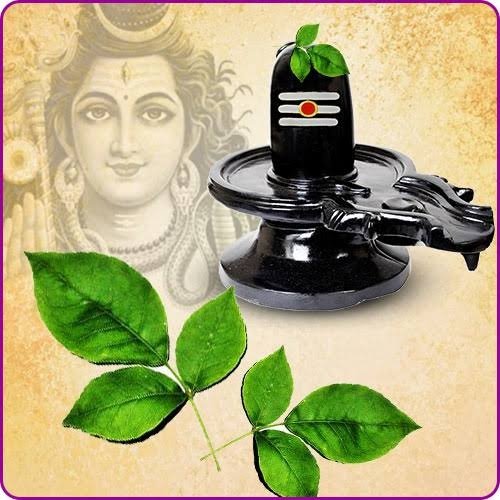
The composition of Bilvashtakam is a testament to the sage’s deep understanding of symbolism, nature, and spirituality. By highlighting the significance of Bilva leaves, the hymn encapsulates several layers of spiritual concepts, making them accessible through a simple act of offering.
Significance of Worshiping Lord Shiva With Bilva Leaves
Worshipping Lord Shiva with Bilva leaves holds immense significance in Hindu spirituality, embodying a rich tapestry of mythological symbolism and religious faith. The Bilva leaf (Aegle marmelos), with its trifoliate shape, is not just a leaf but a symbol of the divine, representing various spiritual and cosmic principles.
The Bilva tree and its leaves are especially dear to Lord Shiva. According to various scriptures, the Bilva tree is considered a manifestation of Shiva himself.
It is believed that the Bilva tree originated from the sweat droplets of Goddess Parvati (Shiva’s consort), which fell on the Mandrachal mountain, hence, every part of the tree is sacred and embodies Shiva’s energy.
Worshiping Lord Shiva with Bilva leaves is a deeply symbolic act steeped in Hindu spirituality, embodying devotion, purification, and cosmic harmony.
The trifoliate structure of the Bilva leaf represents the holy trinity of Brahma, Vishnu, and Shiva, symbolizing the cyclical nature of creation, preservation, and destruction, as well as the integration of the mind, body, and spirit.
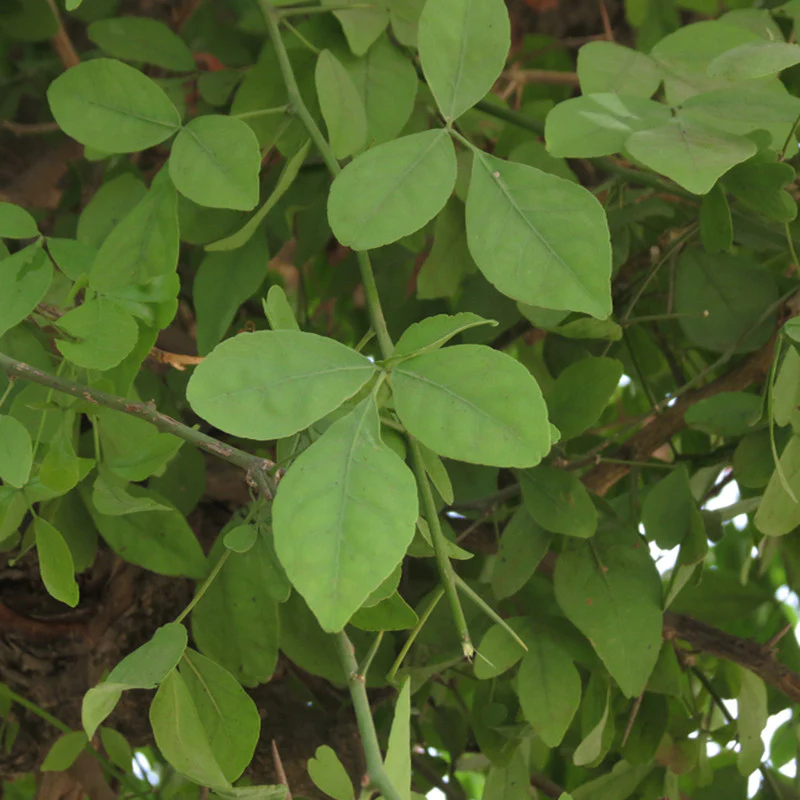
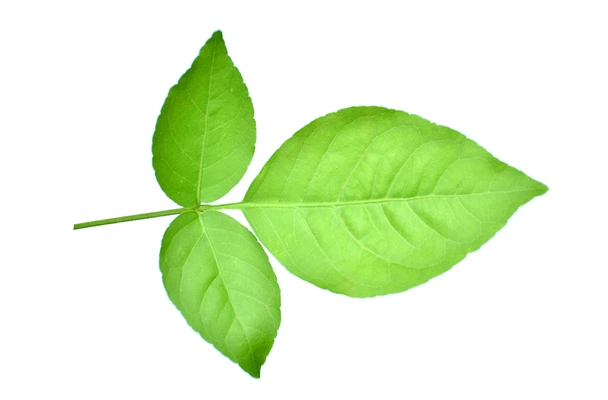
This simple yet profound offering is believed to be especially dear to Shiva, capable of cleansing sins, facilitating spiritual liberation, and invoking blessings for health and prosperity. It points out the sanctity of nature in spiritual practice, highlighting that even the most humble offerings, when given with heartfelt devotion, hold immense divine significance.
The ritual of offering Bilva leaves to Shiva thus serves as a testament to the power of faith, where the natural world is revered as a manifestation of the divine, and the act of offering becomes a conduit for achieving spiritual enlightenment and divine grace.
Bilvashtakam Lyrics In English With Meaning
When you understand the Bilvashtakam Lyrics along with its meaning, this hymn does more than just praise the virtues of a sacred leaf, it serves as a guide for devotees to deepen their connection with the divine.
It suggests that purity, devotion, and the dissolution of sins can be achieved through simple, sincere acts of worship.
Each verse praises the Bilva leaf and connects it to Lord Shiva’s worship. Here are the Bilvashtakam Lyrics In English With Meaning explained verse by verse.
Tridalam trigunakaram trinetram ca triyayudham
Trijanma papasamharam ekabilvam sivarpanam
Offering a single Bilva leaf to Lord Shiva is a simple act depicted as a powerful gesture of devotion, capable of bringing immense spiritual benefits, including the erasure of sins and the attainment of moksha
Tridalam Trigunakaram – translates to “three leaves” that represent the three qualities (Gunas) Sattva (goodness, constructive, harmonious), Rajas (passion, active, confused), and Tamas (darkness, destructive, chaotic).
It’s like saying these three aspects of life are embodied in the Bilva leaf, which you’re offering to Shiva.
Ttrinetram Ca – means “three eyes,” symbolizing Shiva’s all-seeing nature—past, present, and future. It’s a nod to his wisdom and ability to see beyond the ordinary. Offering a leaf with this symbolism is like acknowledging his deep insight and wisdom.
Triyayudham – refers to the three weapons, or rather, the trident (Trishula) that Shiva holds. This weapon signifies his power to destroy evil and ignorance, helping maintain the balance of the universe.
So, when you offer the Bilva leaf, it’s as if you’re touching on that aspect of Shiva’s role as the destroyer and protector.
Trijanma Papasamharam – Highlights the power of the offering to obliterate sins accumulated over three lifetimes. It’s not just about what you did last weekend; it’s about cleansing sins from your past, present, and future lives.
Ekabilvam Sivarpanam – This essentially means offering a single Bilva leaf to Shiva. This simple act is depicted as a powerful gesture of devotion, capable of bringing immense spiritual benefits, including the erasure of sins and the attainment of moksha (liberation from the cycle of birth and death).
Akhanda bilvapatreNa poojite nandikeshware
shudhyantii sarva paapebhyo eka bilvam shivaarpaNam
When Nandikeshwara is worshipped with an unbroken Bilva leaf, all sins are cleansed. I offer this single Bilva leaf to Shiva.
Akhanda bilvapatreNa poojite nandikeshware – “Akhanda” means unbroken or intact, and “bilvapatreNa” refers to the Bilva leaf. “Nandikeshware” is another name for Lord Shiva. This part of the verse emphasizes the importance of offering an unbroken, or perfect, Bilva leaf in the worship of Shiva.
The unbroken leaf symbolizes continuity, wholeness, and purity, which are essential qualities in spiritual offerings.
Shudhyantii sarva paapebhyo – This phrase means that by such worship, all sins are cleansed. It’s a powerful statement about the purifying effect of sincerely offering a Bilva leaf to Shiva. It suggests that this simple act of devotion can wipe the slate clean, regardless of the nature or number of sins.
Eka bilvam shivaarpanam – Finally, “I offer this single Bilva leaf to Shiva” reaffirms the belief that a single, sincere offering made with devotion is enough to gain favor with the divine. It’s not about quantity or the lavishness of the offering; it’s the quality of devotion that counts.
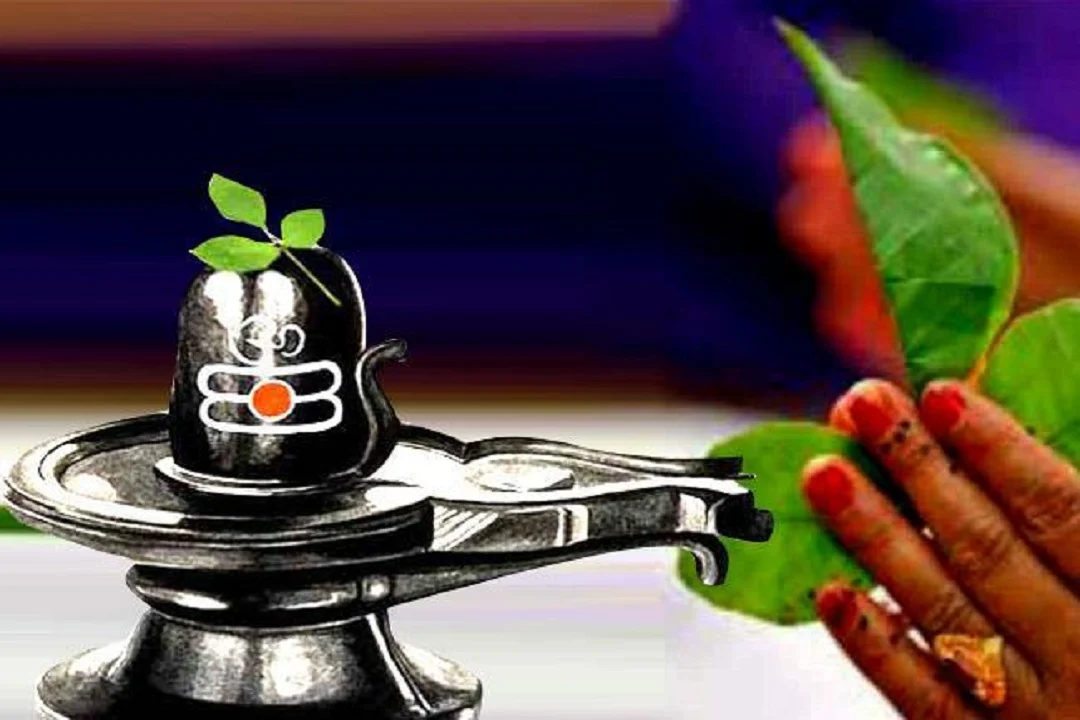
Shaaligram shilaama ekaam vipraaNaam jaatu charpayet
somayadnya mahaapuNyam eka bilvam shivaarpaNam
Offering a single Bilva leaf to Shiva is as meritorious as donating a Shaligram stone to a Brahmin or performing the grand Somayaga sacrifice. I dedicate this single Bilva leaf to Shiva.
Shaaligram shilaama ekaam vipraaNaam jaatu charpayet – The Shaligram is a sacred stone, revered in Hinduism as a representation of Lord Vishnu.
Donating a Shaligram to a Brahmin (a priest or a scholar in Hindu tradition) is considered a highly meritorious act, signifying the offering of something deeply spiritual and valuable.
This part of the verse is saying, “Offering a Bilva leaf is as cool as giving away a Shaligram stone to someone who’s gonna appreciate its divine value.”
Somayadnya mahaapuNyam – The Somayaga is a complex and grand sacrificial ritual performed in ancient India, known for its immense spiritual benefits and the purification it brings.
It’s like one of the big-ticket items in terms of religious ceremonies, requiring significant resources and devotion to accomplish.
This line tells us that offering a single Bilva leaf to Shiva packs the same spiritual punch as pulling off one of these massive rituals.
Eka bilvam shivaarpanam – Once again, we’re back to the core message, “I offer this single Bilva leaf to Shiva.”It reiterates the theme that simplicity, when coupled with sincere devotion, is highly valued in the spiritual realm.
DantikotisahasraNi vajape shataanicha
kotikanyaa mahaadaanam eka bilvam shivaarpaNam
You could do these massive, elaborate acts of devotion and charity, but offering just one Bilva leaf with true devotion is just as powerful, if not more.
DantikotisahasraNi – This term can be a bit tricky to translate directly, but it essentially refers to a vast number, often interpreted as symbolic of a significant quantity or effort.
“Danti” could relate to teeth, suggesting a count as large as thousands of crores (tens of billions), but in this context, it’s more about the magnitude of the comparison rather than a literal count.
Vajape shataanicha – This phrase suggests the recitation of mantras or prayers (“vajape”) hundreds of times. It emphasizes the spiritual practice of japa, or repetitive chanting, as a means to purify the mind and soul.
Kotikanyaa mahaadaanam – Here, “koti” refers to crores (tens of millions), and “kanyaa” means maidens or girls. “Mahaadaanam” means great charity.
This line suggests the giving away of millions of maidens in marriage, which in ancient times was considered one of the highest forms of charity, providing for the well-being of others on a grand scale.
Eka bilvam shivaarpaNam – This part brings it all home by saying, “I offer this single Bilva leaf to Shiva.” It’s a declaration that offering a single Bilva leaf with devotion is spiritually equivalent to performing these grand acts of penance, prayer, and charity.
Laxmyaa stnam unpanam mahadevasya cha priyam
bilva vruksham prayachchhaami eka bilvam shivaarpaNam
Bilva Tree born from Goddess Lakshmi, and beloved to Mahadeva (another name for Shiva), I offer the Bilva tree, presenting this single Bilva leaf to Shiva.
Laxmyaa stnam unpanam – This part is poetic, saying the Bilva tree is as though it has emerged from the very essence of nourishment provided by Goddess Lakshmi herself.
In Hindu mythology, Lakshmi is the goddess of wealth, fortune, and prosperity. By linking the Bilva tree to her, the verse is imbuing the tree with qualities of auspiciousness and sanctity.
Mahadevasya cha priyam – Here, it’s stated that the Bilva tree is dear to Mahadeva, a revered name for Lord Shiva. Shiva’s fondness for the Bilva tree elevates its significance, making it an essential element in his worship.
Bilva vruksham prayachchhaami eka bilvam shivaarpaNam – This verse culminates with the devotee offering a Bilva tree, symbolized by the act of offering a single Bilva leaf to Lord Shiva. It’s a gesture of devotion, signifying the offering of something deeply sacred and cherished by the deity.
Darshanam bilva vrukshasya sparshanam paapanaashanam
Aghorapaapa samhaaram eka bilvam shivaarpaNam
The act of just seeing and touching the Bilva tree shines a light on the spiritual potency, emphasizing its ability to purify and absolve sins.
Darshanam bilva vrukshasya – “Darshanam” refers to the act of seeing, and in a spiritual context, it implies a kind of visual blessing or the auspicious sight of something sacred. So, seeing the Bilva tree is considered to bring good fortune and blessings.
Sparshanam paapanaashanam – “Sparshanam” means touch. This part of the verse suggests that merely touching the Bilva tree can destroy sins (“paapanaashanam”). It’s a poetic way of saying that the Bilva tree is so sacred that even physical contact with it has the power to cleanse one’s soul.
Aghorapaapa samhaaram – This phrase amplifies the previous idea, stating that the Bilva tree can annihilate even the most heinous sins (“aghorapaapa”). “Samhaaram” means destruction or eradication, highlighting the tree’s potent purifying abilities.
Eka bilvam shivaarpaNam – Finally, the verse concludes with the act of offering a single Bilva leaf to Lord Shiva, reaffirming the belief that such an offering, made with devotion, is immensely powerful and capable of invoking divine grace.
Kashi kshetra nivasam cha kalabhairava darshanam
Prayaage maadhavam drushtvaa Ekabilvam shivaarpanam
Residing in the holy city of Kashi, having the vision of Kalabhairava, and seeing Madhava in Prayaga, I equate all these to offering a single Bilva leaf to Shiva.
Kashi kshetra nivasam cha – Kashi (Varanasi) is one of the holiest cities in Hinduism, believed to be the abode of Lord Shiva. Residing there is considered highly auspicious and a means to attain spiritual liberation. The verse starts by mentioning the act of living in Kashi as a significant spiritual endeavor.
Kalabhairava darshanam – Kalabhairava is a fierce manifestation of Lord Shiva, guardian of the city of Kashi. Having darshan, or a sacred sighting of Kalabhairava, is said to remove sins and bestow blessings. It’s a spiritual experience highly sought after by devotees.
Prayaage maadhavam drushtvaa – Prayaga (Allahabad), especially during the Kumbh Mela, is another significant pilgrimage spot. Madhava, a name for Lord Vishnu, represents the aspect of preservation in the Hindu trinity. Seeing Madhava in Prayaga is mentioned as another profound act of devotion.
Ekabilvam shivaarpanam – the verse concludes by saying that offering a single Bilva leaf to Shiva is equivalent to the spiritual merits gained from residing in Kashi, having darshan of Kalabhairava, and seeing Madhava in Prayaga. It emphasizes the profound spiritual value and simplicity of offering a Bilva leaf to Lord Shiva.
Moolato brahma roopaaya madhyato Vishnu roopiNe
agrataha shiva roopaaya eka bilvam shivaarpaNam
From the root, it represents Brahma, in the middle, it embodies Vishnu, and at the tip, it takes the form of Shiva. I offer this single Bilva leaf to Shiva.
Moolato brahma roopaaya – The root of the Bilva leaf symbolizes Brahma, the god of creation in Hinduism. This association suggests that the Bilva leaf, from its very origin or base, embodies the creative force of the universe.
Madhyato Vishnu roopiNe – The middle part of the leaf represents Vishnu, the preserver among the trio. This indicates that the Bilva leaf, in its entirety, not only initiates creation but also sustains and nurtures it, just as Vishnu does for the universe.
Agrataha shiva roopaaya – The tip of the leaf is associated with Shiva, the destroyer or transformer. This symbolism reflects the cycle of creation, preservation, and dissolution, with the Bilva leaf representing the entire cosmic process.
Eka bilvam shivaarpaNam – The offering of a single Bilva leaf to Shiva is a gesture that encapsulates the essence of the entire cosmos, from creation to dissolution. Its depiction of the Bilva leaf as a microcosm of the universe and the divine.
By offering a Bilva leaf to Shiva, the devotee symbolically offers the essence of Brahma, Vishnu, and Shiva—thereby acknowledging the unity and the cyclical nature of the cosmos.
Benefits of Chanting Bilvashtakam Lyrics
Chanting the Bilvashtakam Lyrics with meaning is more than just reciting words. It is considered to have numerous spiritual, emotional, and mental benefits. It’s not just about the act of chanting, it’s about the devotion and the energy that goes into it. Here’s a rundown of the benefits you might experience.
Spiritual Purification: The Bilvashtakam extols the virtues of the Bilva leaf and its significance in purifying the soul. Chanting these Bilvashtakam lyrics is believed to cleanse past sins and karmic debts, fostering a sense of spiritual cleanliness and renewal.
Direct Connection with the Divine: Through the act of chanting, devotees can feel a closer connection to Lord Shiva. The hymn, with its profound meanings and vibrations, is said to enhance one’s spiritual awareness and devotion, making the divine feel more accessible.
Peace and Tranquility: The rhythmic and melodic nature of the chant can induce a meditative state, calming the mind and reducing stress. This tranquility can help in managing anxiety and promoting mental health.
Concentration and Focus: Regular chanting of the Bilvashtakam Lyrics can improve concentration and focus. The act requires one to stay engaged and present, which can enhance cognitive functions and attention span over time.
Spiritual Merit (Punya): Offering the Bilva leaf to Lord Shiva is highly meritorious. Chanting the Bilvashtakam Lyrics, which glorifies this act, is believed to accumulate spiritual merit, aiding the devotee’s journey towards liberation (Moksha).
Protection from Negativity: It’s believed that chanting this hymn can provide protection against negative energies and influences. The sacred vibrations created by chanting are said to form a protective shield around the devotee.
Enhanced Devotional Attitude: Regular chanting can deepen one’s devotion towards Lord Shiva, fostering a more profound spiritual practice. This enhanced devotion can lead to greater spiritual growth and understanding.
Harmony in Life: The Bilvashtakam promotes the virtues of simplicity and sincerity in worship. Chanting it regularly can inspire these qualities in one’s life, leading to harmony and contentment.
Physical Health Benefits: While primarily a spiritual practice, the act of chanting can have physical benefits as well, such as improved breathing due to the controlled breathing patterns in chanting and potentially lowered blood pressure from the calming effects of the practice.
Community and Belonging: Participating in group chanting with Bilvashtakam Lyrics can foster a sense of community and belonging among devotees, providing social support and deepening connections within the spiritual community.
Conclusion
The Bilvashtakam Lyrics draw parallels between the act of offering a Bilva leaf to Lord Shiva and various virtuous deeds and pilgrimages, suggesting that such a simple offering can equate to or even surpass these in spiritual merit. The Bilva leaf, with its trifoliate shape, is symbolically connected to the Hindu trinity of Brahma, Vishnu, and Shiva, representing the cosmic cycle of creation, preservation, and dissolution.
Chanting the Bilvashtakam Lyrics by understanding its meaning is described as an act of deep devotion that can purify the soul, erase sins, and bring the devotee closer to liberation. The hymn emphasizes the power of faith and the importance of sincerity in worship, suggesting that even the simplest acts of devotion, like offering a Bilva leaf, are profound if done with a pure heart.
The Bilvashtakam thus serves as a reminder of the accessibility of divine grace through sincere devotion, highlighting the Bilva leaf’s role as a symbol of purity, devotion, and the cyclical nature of the cosmos. Through its verses, the Bilvashtakam conveys a profound spiritual message, advocating for a life of simplicity, purity, and devotion to Lord Shiva.
- The Namagiri Thayar Mantra – For Wisdom, Creativity & Prosperity - April 29, 2024
- Krishnashtakam – “Krishnam Vande Jagadgurum” – Lyrics & Meaning - April 4, 2024
- Karadarshanam – “Karagre Vasate Lakshmi” – Meaning & Benefits - March 26, 2024

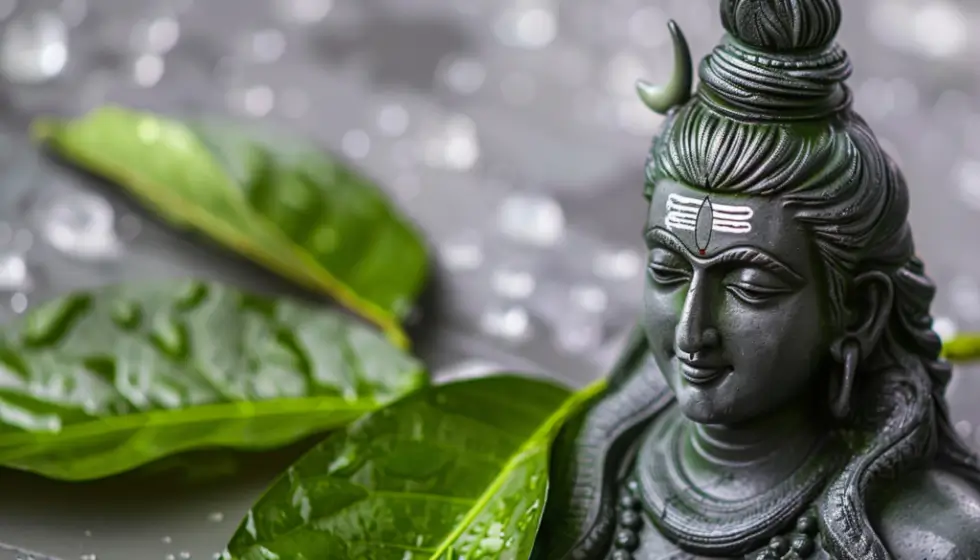
0 Comments